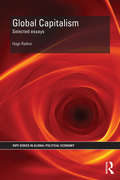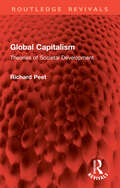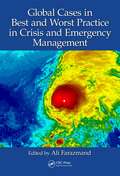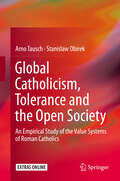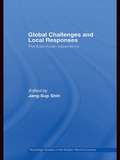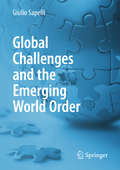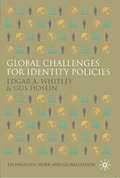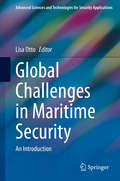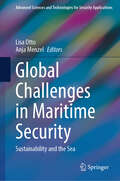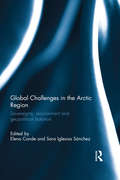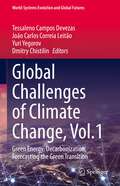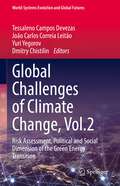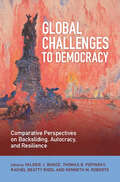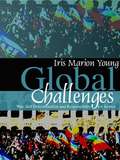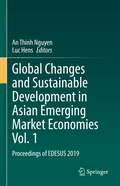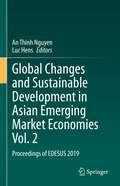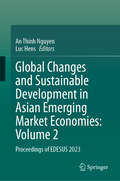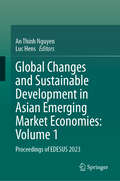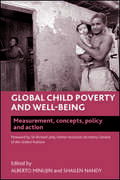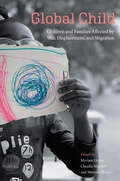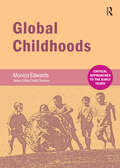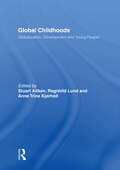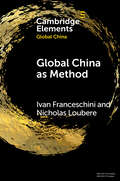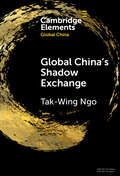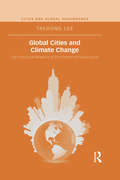- Table View
- List View
Global Capitalism: Selected Essays (RIPE Series in Global Political Economy)
by Hugo RadiceThe essays in this volume were published across the 1984-2011 period, and range across a variety of topics and approaches to investigate the changing nature of global capitalism as a social order. As such, they are a valuable and instructive account of the evolution of global capitalism and of the debates which sought to make sense of this; moreover, they enable us to understand more clearly how capitalism may change and evolve in the coming years and decades. The introduction provides a brief historical account of how global capitalism has changed since the 1960s, before summarising each of the essays, situating them more immediately in the context in which they were written. After sketching the evolution of his views over the period, the author concludes by discussing some important dimensions of global capitalism that need further study. The twelve essays are presented in four sections, dealing with the overarching theme of globalisation; the case of Britain; the developing regions of the global South and the former Soviet bloc; and the crisis that has gripped global capitalism since 2008. Presenting an interdisciplinary approach that corresponds with the emergence of international political economy as a distinct field of scholarship, this book will prove to be an invaluable resource for students and scholars of international political economy, politics, economics, international relations, development studies, human geography, critical sociology and business studies.
Global Capitalism: Theories of Societal Development (Routledge Revivals)
by Richard PeetIn Global Capitalism (originally published in 1991), Richard Peet surveys the various approaches made by social theory towards seeing history in terms of its regional dynamics. He reviews environmental determinism, modernization, dependency, and world systems theories, and argues that the most capacious and dynamic model continues to be historical materialism.The volume presents a broad outline of global development through time, analysing primitive communism, lineage societies and the various kinds of tributary modes, and providing a closer examination of capitalism in terms of the phases and forms of its past and present. The author defends the centrality of structural Marxism to theories of global development and argues that its ideas can be furthered by the partial synthesis of other perspectives, such as the feminist critique.This book assumes no previous knowledge of the theories surveyed. It introduces complex material in an understandable form and will be valuable both to development professionals and to anyone interested in societal change.
Global Cases in Best and Worst Practice in Crisis and Emergency Management
by Ali FarazmandGlobal Cases in Best and Worst Practice in Crisis and Emergency Management is the first book to focus on select global cases from the perspective of best and worst practices in the context of crisis and emergency management. Bringing together the most established scholars and experts in the field, it offers theories along with an empirical, success
Global Catholicism, Tolerance and the Open Society: An Empirical Study of the Value Systems of Roman Catholics
by Arno Tausch Stanislaw ObirekThis book systematically assesses the political and social values of the more than 1.3 billion Catholics around the globe, by far the largest denomination of Western Christianity. Based on an extensive analysis of data from the World Values Survey and other global opinion surveys, the book sheds new light on the value systems and opinions of Roman Catholics. The authors highlight core problems and challenges the Church is currently facing in adapting to the modern world, including Catholic anti-Semitism, religious and sexual tolerance, and opinions towards democracy, while also offering an anthropological reflection on how well the Church is adapting or failing to adapt to the requirements of an open society.
Global Challenges and Local Responses: The East Asian Experience (Routledge Studies in the Modern World Economy #Vol. 67)
by Jang-Sup ShinEast Asia has in many ways been the cockpit of the globalization process. If the phenomenon as it is generally defined is largely recognized as a relatively recent one, the countries that have experienced most change during this period have been in the region. Rapid economic growth leading to the Tigers label was followed by financial crisis and partial recovery. Underlying this has been the remarkable success story of Japan since the Second World War, followed by the current, seemingly inexorable progress of China towards centrality on the world stage. Jang-Sup Shin has amassed an international team of contributors to shed light on how the various Asian countries have responded to the globalization process. These include James Crotty, Lu Ding and Ha-Joon Chang.
Global Challenges and the Emerging World Order
by Giulio SapelliThis book offers a fascinating overview of the challenges posed by the world's new geostrategic order and likely future directions. It opens with an unconventional view of the Arab Spring, identifying its origins in the relative US withdrawal from the Middle East caused by both the need for military disengagement for economic reasons and the discovery of shale gas and tight oil in the heart of the North American continent. The rise in the geostrategic importance of Putin's Russia is explored in this context. The implications of the worldwide economic crisis are analyzed in depth: the author's interpretation is that the world is entering a phase of unstable growth generated by hyper financialization and deflation. Against this background, the book explores the US attempt to trigger growth through the Transatlantic Trade and Investment Partnership, the impact of the Trans-Pacific Partnership (based on the US-Australia military alliance) in restraining China's advance, and the potential for Africa to become the driver of the world's economic future if it can resist Chinese penetration and continue the nation-building process.
Global Challenges for Identity Policies
by Edgar A. WhitleyThe goals of this book are to provide a comprehensive review of identity policies as they are being implemented in various countries around the world, to consider the key arenas where identity policies are developed and to provide intellectual coherence for making sense of these various activities.
Global Challenges in Maritime Security: An Introduction (Advanced Sciences and Technologies for Security Applications)
by Lisa OttoFrom pirates to smugglers, migrants to hackers, from stolen fish to smuggled drugs, the sea is becoming a place of increasing importance on the global agenda as criminals use it as a theatre to conduct their crimes unfettered. This volume sets out to provide an introduction to the key issues of pertinence in Maritime Security today. It demonstrates why the sea is a space of great strategic importance, and how threats to security at sea have a real impact for people around the world. It examines an array of challenges and threats to security playing out at sea, including illegal, unreported and unregulated fishing, irregular migration, piracy, smuggling of illicit goods, and cyber security, while also looking at some of the mechanism and role-players involved in addressing these perils. Each chapter provides an overview of the issue it discusses and provides a brief case study to illustrate how this issue is playing out in real-life. This book thus allows readers an insight into this evolving multidisciplinary field of study. As such, it makes for an informative read for academics and practitioners alike, as well as policymakers and students, offering a well-rounded introduction of the main issues in current Maritime Security.
Global Challenges in Maritime Security: Sustainability and the Sea (Advanced Sciences and Technologies for Security Applications)
by Lisa Otto Anja MenzelAchieving sustainability is perhaps the single-most important task for our generation. In the face of a looming climate disaster, calls for the sustainable use of the world’s resources are getting louder. As the sea covers more than 70 per cent of the earth’s surface, this holds even more true for the use of ocean resources. Despite its vastness, the sea has often been a securitised and politicised space, where the concepts of sustainability and security meet at sea in the form of a myriad of important contemporary issues. In this volume, we set out the intersection between sustainability and security alongside the security-development nexus, and examine these issues under four dimensions of security: economic security, ecological security, human security, and traditional security. Within sections dedicated to each of these we explore both theory and practice by offering cases alongside a conceptual discussion, and in so doing cover topics ranging from the Blue Economy and the net-zero agenda, to natural disasters and climate change, from food security and the future of Small Island Developing States, to the geopolitics of the Arctic. This book takes a bird’s eye view, connecting the dots between these issues of security and sustainability, and ending with scenarios for the future with policy-making in mind. This volume presents a timely and compelling argument that policymakers and scholars need to come to terms with the intersection of sustainability and security at sea. The editors detail a clear and insightful conceptual approach for grasping the simultaneity and interplay of security and sustainability concerns that will give inspiration to further research in the field. Chapter contributors convincingly illustrate aspects of this approach across regions, scales and sites of political engagement – from port cities to the UN. A must read for students, researchers and practitioners of ocean politics. Elana Wilson Rowe, Research Professor at the Norwegian Institute of International Affairs (NUPI) “Too often issues of security and sustainability at sea have been studied in narrow terms. This volume makes a critical contribution the literature by unpacking the interconnections and interdependence between these two vitally important issues.” Robert McCabe, Assistant Professor and Director of the MA Maritime Security Programme at Coventry University. "In this timely publication, an international set of contributors portray a rich array of views on the oceans, security and sustainability for the reader. Of particular value is how the security-sustainability nexus runs through the chapters to emphasise the ever-growing importance and relevance of this interplay.” Francois Vreÿ, Professor Emeritus of Military Science and Research Coordinator at the Security Institute for Governance and Leadership in Africa (SIGLA), Stellenbosch University.
Global Challenges in the Arctic Region: Sovereignty, environment and geopolitical balance
by Sara Iglesias Sánchez Elena CondeBringing together interconnected discussions to make explicit the complexity of the Arctic region, this book offers a legal discussion of the ongoing territorial disputes and challenges in order to frame their impact into the viability of different governance strategies that are available at the national, regional and international level. One of the intrinsic features of the region is the difficulty in the determination of boundaries, responsibilities and interests. Against this background, sovereignty issues are intertwined with environmental and geopolitical issues that ultimately affect global strategic balances and international trade and, at the same time, influence national approaches to basic rights and organizational schemes regarding the protection of indigenous peoples and inhabitants of the region. This perspective lays the ground for further discussion, revolving around the main clusters of governance (focusing on the Arctic Council and the European Union, with the particular roles and interest of Arctic and non-Arctic states, and the impact on indigenous populations), environment (including the relevance of national regulatory schemes, and the intertwinement with concerns related to energy, or migration), strategy (concentrating in geopolitical realities and challenges analysed from different perspectives and focusing on different actors, and covering security and climate change related challenges). This collection provides an avenue for parallel and converging research of complex realities from different disciplines, through the expertise of scholars from different latitudes.
Global Challenges of Climate Change, Vol.1: Green Energy, Decarbonization, Forecasting the Green Transition (World-Systems Evolution and Global Futures)
by Tessaleno Campos Devezas João Carlos Correia Leitão Yuri Yegorov Dmitry ChistilinThis two-volume book offers a broad range of discussions on the immense challenge of climate change, one confronting every country on the planet and forcing them to find a path towards a sustainable future that will not have disastrous consequences in relation to our chances of survival. It also presents a snapshot of the status quo, which reflects all the decisions and measures taken to date. Analyzing the consequences of the steps that will shape our future, the two volumes also reflect on important decisions at a global level that have already been taken. In this first volume on green energy, decarbonization, and forecasting the green transition, respected international scholars analyze various technical aspects of and alternatives to the so-called “green energy transition,” as well as measures intended to help reach the ambitious goal of net zero emissions within the next thirty years. Throughout the 13 chapters, the authors forecast future scenarios for the use of alternative energy sources. Additionally, the book discusses questions regarding the suitability of current measures and presents innovative alternatives that have remained largely overlooked.This book is a must-read for scholars, researchers and students, as well as policymakers interested in a better understanding of climate change, present scenarios, and alternative solutions and measures.
Global Challenges of Climate Change, Vol.2: Risk Assessment, Political and Social Dimension of the Green Energy Transition (World-Systems Evolution and Global Futures)
by Tessaleno Campos Devezas João Carlos Correia Leitão Yuri Yegorov Dmitry ChistilinThis two-volume book offers a broad range of discussions on the immense challenge of climate change, one confronting every country on the planet and forcing them to find a path towards a sustainable future that will not have disastrous consequences in relation to our chances of survival. It also presents a snapshot of the status quo, which reflects all the decisions and measures taken to date. Analyzing the consequences of the steps that will shape our future, the two volumes also reflect on important decisions at a global level that have already been taken. This second volume on risks assessment and the political and social dimension of the green energy transition is structured into 14 chapters. International renowned scholars discuss the inherent risks that arise in consequence of the transition to the intensive use of low carbon energy sources and global warming, risks related to food and water security, as well as risks of social and political conflicts. They further examine the dependence on individual countries' industrial structures and on their socio-economic development level as challenges to climate change solutions and to the global energy policy agenda.This book is a must-read for scholars, researchers and students, as well as policymakers interested in a better understanding of climate change, present scenarios, and alternative solutions and measures.
Global Challenges to Democracy: Comparative Perspectives on Backsliding, Autocracy, and Resilience
by Thomas B. Pepinsky Kenneth M. Roberts Valerie J. Bunce Rachel Beatty ReidlFollowing democracy's global advance in the late 20th century, recent patterns of democratic erosion or 'backsliding' have generated extensive scholarly debate. Backsliding towards autocracy is often the work of elected leaders operating within democratic institutions, challenging conventional thinking about the logic of democratic consolidation, the enforcement of institutional checks and balances, and the development and reproduction of democratic norms. This volume tackles these challenges head-on, drawing theoretical insights from classic literature on democratic transitions and consolidation to help explain contemporary challenges to democracy. It offers a comparative perspective on the dynamics of democratic backsliding, the changing character of authoritarian threats, and the sources of democratic resiliency around the world. It also integrates the institutional, civil society, and international dimensions of contemporary challenges to democracy, while providing coverage of Western and Eastern Europe, South and Southeast Asia, Africa, Latin America, and the United States.
Global Challenges: War, Self-Determination And Responsibility For Justice
by Iris Marion YoungIn the late twentieth century many writers and activists envisioned new possibilities of transnational cooperation toward peace and global justice. In this book Iris Marion Young aims to revive such hopes by responding clearly to what are seen as the global challenges of the modern day. Inspired by claims of indigenous peoples, the book develops a concept of self-determination compatible with stronger institutions of global regulation. It theorizes new directions for thinking about federated relationships between peoples which assume that they need not be large or symmetrical. Young argues that the use of armed force to respond to oppression should be rare, genuinely multilateral, and follow a model of law enforcement more than war. She finds that neither cosmopolitan nor nationalist responses to questions of global justice are adequate and so offers a distinctive conception of responsibility, founded on participation in social structures, to describe the obligations that both individuals and organizations have in a world of global interdependence. Young applies clear analysis and cogent moral arguments to concrete cases, including the wars against Serbia and Iraq, the meaning of the US Patriot Act, the conflict in Palestine/Israel, and working conditions in sweat shops.
Global Changes and Sustainable Development in Asian Emerging Market Economies Vol. 1: Proceedings of EDESUS 2019
by An Thinh Nguyen Luc HensThis two-volume set presents the conference papers from the 1st International Conference on Economics, Development and Sustainability (EDESUS 2019), organized by the University of Economics and Business, Vietnam National University, Hanoi. The collection addresses global changes and sustainable development in Vietnam and other emerging market economies in Asia, and covers wider topics such as economics and business (e.g. economic theory, national and international income distribution, macroeconomic policies, sectors of economy, productivity developments, financial market, business governance, bank financing), development and sustainability (e.g. developing process, development policy, public policy, sustainable growth, sustainability tools, sustainable livelihood, sustainable tourism, green growth), and resources and global change (e.g. human resources, natural resources, climate change, globalization, global challenges). The books are of interest to professors, researchers, lecturers, and students in economics and geography, consultants, and decision makers interested in global changes and sustainable development. Volume 1 focuses on economic development in Vietnam and other emerging market economies in Asia. This covers topics such as economics and business (e.g. economic theory, national and international income distribution, macroeconomic policies, sectors of economy, productivity developments, financial market, business governance, bank financing) and development studies (e.g. developing process, development policy, public policy, green growth).
Global Changes and Sustainable Development in Asian Emerging Market Economies Vol. 2: Proceedings of EDESUS 2019
by An Thinh Nguyen Luc HensThis two-volume set presents the conference papers from the 1st International Conference on Economics, Development and Sustainability (EDESUS 2019), organized by the University of Economics and Business, Vietnam National University, Hanoi. The collection addresses global changes and sustainable development in Vietnam and other emerging market economies in Asia, and covers wider topics such as economics and business (e.g. economic theory, national and international income distribution, macroeconomic policies, sectors of economy, productivity developments, financial market, business governance, bank financing), development and sustainability (e.g. developing process, development policy, public policy, sustainable growth, sustainability tools, sustainable livelihood, sustainable tourism, green growth), and resources and global change (e.g. human resources, natural resources, climate change, globalization, global challenges). The books are of interest to professors, researchers, lecturers, and students in economics and geography, consultants, and decision makers interested in global changes and sustainable development. Volume 2 focuses on global changes and sustainable development in Vietnam and other emerging market economies in Asia. This covers topics such as sustainability (e.g. sustainable growth, sustainability tools, sustainable livelihood, sustainable tourism), and change in resources globally (e.g. human resources, natural resources, climate change, globalization, global challenges).
Global Changes and Sustainable Development in Asian Emerging Market Economies: Proceedings of EDESUS 2023
by An Thinh Nguyen Luc HensThis two-volume set presents the conference papers from the 2023 iteration of the International Conference on Economics, Development and Sustainability (EDESUS 2023), organized by the VNU University of Economics and Business, Vietnam National University, Hanoi. The collection addresses global changes and sustainable development in Vietnam and other emerging market economies in Asia, and covers wider topics such as economics and business (e.g. economic theory, national and international income distribution, macroeconomic policies, sectors of economy, productivity developments, financial market, business governance, bank financing), development and sustainability (e.g. developing process, development policy, public policy, sustainable growth, sustainability tools, sustainable livelihood, sustainable tourism, green growth), and resources and global change (e.g. human resources, natural resources, climate change, globalization, global challenges). The books are of interest to professors, researchers, lecturers, and students in economics and geography, consultants, and decision makers interested in global changes and sustainable development. Volume 2 focuses on global changes and sustainable development in Vietnam and other emerging market economies in Asia. This covers topics such as sustainability (e.g. sustainable growth, sustainability tools, sustainable livelihood, sustainable tourism), and change in resources globally (e.g. human resources, natural resources, climate change, globalization, global challenges).
Global Changes and Sustainable Development in Asian Emerging Market Economies: Proceedings of EDESUS 2023
by An Thinh Nguyen Luc HensThis two-volume set presents the conference papers from the 2023 iteration of the International Conference on Economics, Development and Sustainability (EDESUS 2023), organized by the VNU University of Economics and Business, Vietnam National University, Hanoi. The collection addresses global changes and sustainable development in Vietnam and other emerging market economies in Asia, and covers wider topics such as economics and business (e.g. economic theory, national and international income distribution, macroeconomic policies, sectors of economy, productivity developments, financial market, business governance, bank financing), development and sustainability (e.g. developing process, development policy, public policy, sustainable growth, sustainability tools, sustainable livelihood, sustainable tourism, green growth), and resources and global change (e.g. human resources, natural resources, climate change, globalization, global challenges). The books are of interest to professors, researchers, lecturers, and students in economics and geography, consultants, and decision makers interested in global changes and sustainable development. Volume 1 focuses on economic development in Vietnam and other emerging market economies in Asia. This covers topics such as economics and business (e.g. economic theory, national and international income distribution, macroeconomic policies, sectors of economy, productivity developments, financial market, business governance, bank financing) and development studies (e.g. developing process, development policy, public policy, green growth).
Global Child Poverty and Well-Being: Measurement, Concepts, Policy and Action (Studies in Poverty, Inequality and Social Exclusion series)
by Alberto Minujin & Shailen NandyChild poverty is a central and present part of global life, with hundreds of millions of children around the world enduring tremendous suffering and deprivation of their most basic needs. Despite its long history, research on poverty and development has only relatively recently examined the issue of child poverty as a distinct topic of concern. This book brings together theoretical, methodological and policy-relevant contributions by leading researchers on international child poverty. With a preface from Sir Richard Jolly, Former Assistant Secretary General of the United Nations, it examines how child poverty and well-being are now conceptualized, defined and measured, and presents regional and national level portraits of child poverty around the world, in rich, middle income and poor countries. The book's ultimate objective is to promote and influence policy, action and the research agenda to address one of the world's great ongoing tragedies: child poverty, marginalization and inequality.
Global Child: Children and Families Affected by War, Displacement, and Migration (Genocide, Political Violence, Human Rights)
by Andrew Jones Inka Weissbecker Leesa Hamilton Jaswant Guzder Churnjeet Mahn Michaelina Jakala April Mandrona Mateja Celestina Warren Linds Fatima Khan Karen Paul Nagui Demian Katie Mullins Sharon Bond Neil Bilotta Maya Fennig Alusine Bah Ines Marchand Ej Milne Mayra Guzman Farhio Ahmed Glynis Clacherty Thea Shahrokh Miranda D'Amico Meaghan ShevellArmed conflicts continue to wreak havoc on children and families around the world with profound effects. In 2017, 420 million children—nearly one in five—were living in conflict-affected areas, an increase in 30 million from the previous year. The recent surge in war-induced migration, referred to as a “global refugee crisis” has made migration a highly politicized issue, with refugee populations and host countries facing unique challenges. We know from research related to asylum seeking families that it is vital to think about children and families in relation to what it means to stay together, what it means for parents to be separated from their children, and the kinds of everyday tensions that emerge in living in dangerous, insecure, and precarious circumstances. In Global Child, the authors draw on what they have learned through their collaborative undertakings, and highlight the unique features of participatory, arts-based, and socio-ecological approaches to studying war-affected children and families, demonstrating the collective strength as well as the limitations and ethical implications of such research. Building on work across the Global South and the Global North, this book aims to deepen an understanding of their tri-pillared approach, and the potential of this methodology for contributing to improved practices in working with war-affected children and their families.
Global Childhoods (Critical Approaches to the Early Years)
by Monica EdwardsThis up to date text is suitable for students on all early years courses that include a module on global childhoods. Taking an ecological approach, it examines how culture and society shape childhoods through considering the lived experiences of children internationally. It begins by questioning the meaning of childhood and explores the historical, cultural and social views of childhood and children, including the roles of race, class and gender. It considers families and parenting from a global perspective and progresses to examine the relationship between the state and children by evaluating international approaches to education, health and welfare and the ways inequalities between the minority and majority world impact on children. The role of research on and with children in informing these debates is fully explored. Most importantly the reader is challenged to reflect on how global perspectives can be used to support an understanding of inclusion and diversity in their practice.
Global Childhoods: Globalization, Development And Young People
by Stuart Aitken Anne Trine Kjørholt Ragnhild LundThis astute book initiates a broad discussion from a variety of different disciplines about how we place children nationally, globally and within development discourses. Unlike other books of its kind, it does not seek to dwell solely on the abiding complexities of local comparisons. Rather, it elaborates larger concerns about the changing nature of childhood, young people’s experiences, their citizenship and the embodiment of their political identities as they are embedded in the processes of national development and globalization. In particular, this book concentrates on three main issues: nation building and developing children, child participation and activism in the context of development, and globalization and children’s live in the context of what has been called "the end of development." These are relatively broad research perspectives that find focus in what the authors term "reproducing and developing children" as a key issue of national and global concern. They further argue that understanding children and reproduction is key to understanding globalization.
Global China as Method (Elements in Global China)
by Nicholas Loubere Ivan FranceschiniIs China part of the world? Based on much of the political, media, and popular discourse in the West the answer is seemingly no. Even after four decades of integration into the global socioeconomic system, discussions of China continue to be underpinned by a core assumption: that the country represents a fundamentally different 'other' that somehow exists outside the 'real' world. Either implicitly or explicitly, China is generally depicted as an external force with the potential to impact on the 'normal' functioning of things. This core assumption, of China as an orientalised, externalised, and separate 'other', ultimately produces a distorted image of both China and the world. This Element seeks to illuminate the ways in which the country and people form an integral part of the global capitalist system. This title is also available as Open Access on Cambridge Core.
Global China's Shadow Exchange (Elements in Global China)
by Tak-Wing NgoThis Element shows China has assumed a historical role in shaping a new turn in globalization. It has assertively engaged in the open globalizing process through its Belt and Road Initiative as well as in the clandestine process through its shadow networks. These networks have incorporated millions of common people who are unwitting agents of transnational exchange in a global shadow economy. In contrast to the neoliberal phase, the shadow turn in globalization is driven by a plurality of individual, corporate, and state actors with unique divisions of labour, hierarchies of control and domination, and modes of operation. By virtue of being a nodal centre for shadow operations, China is exerting its shadow power in regrouping global city networks, redefining global value chains, and reconfigurating state borders and power.
Global Cities and Climate Change: The Translocal Relations of Environmental Governance (Cities and Global Governance)
by Taedong LeeCities have led the way to combat climate change by planning and implementing climate mitigation and adaptation policies. These local efforts go beyond national boundaries. Cities are forming transnational networks to enhance their understandings and practices for climate policies. In contrast to national governments that have numerous obstacles to cope with global climate change in the international and national level, cities have become significant international actors in the field of international relations and environmental governance. Global Cities and Climate Change examines the translocal relations of cities that have made an international effort to collectively tackle climate change. Compared to state-centric terms, international or trans-national relations, trans-local relations look at policies, politics, and interactions of local governments in the globalized world. Using multi-methods such as multi-level analysis, comparative case studies, regression analysis and network analysis, Taedong Lee illustrates why some cities participated in transnational climate networks for cities; under what conditions cities internationally cooperate with other cities, with which cities; and which factors influence climate policy performance. An essential read to all those who wish to understand the driving factors for local governments’ engagement in global climate governance from a theoretical as well as practical point of view. Lee makes a valuable contribution to the fields of international relations, environmental policies, and urban studies.
